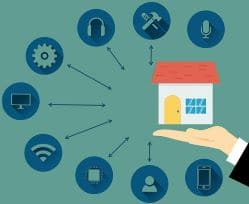The Most Important Decisions You Need to Make When Automating Your Home

Automating your home can make it much more comfortable. It can also make many of your daily tasks more time-efficient. Imagine, you can control different home devices and appliances with an app. Or you can adjust the height of your lifting desk with the simple push a button.
Some ideas that seemed too futuristic just a couple of decades ago can be implemented today with a couple of actuators or a telescopic column; for example, controlling the lights of your house with a voice command. This is the so-called ‘smart home’ concept.
An attractive aspect of home automation is the possibility to implement it yourself. If you are a DIY type, you will enjoy working on different home automation projects. But if you don’t have much experience with such projects, there are some important decisions to make. You have to decide on:
- What you are going to automate;
- What smart home platform you are going to use;
We will discuss in detail each of these points.
Select the Device to Automate
You can automate practically any part of your home. Hence, you must decide first what you want to automate. Otherwise, you will end up buying smart devices and automation equipment that you won’t use. A good idea is to start with the automation of something relatively simple like your desk.
Some manufacturers offer kits that can convert a regular desk into a motorized desk. This type of desk, also known as a standing desk, adjusts the height of the desktop with the push of a button. You can purchase a kit to build a standing desk from scratch. This type of automation project is very intuitive and suitable for beginners.
Door and window automation are other projects that are relatively easy. Likewise, building a TV lifter is a good project for a beginner. All these projects require electromechanical devices known as linear actuators. In most cases, you can buy all the necessary Custom Controls for the project as a kit.
After gaining some experience with basic projects, you’ll be able to automate other parts of your house. Before you start a project, read the manuals and specifications of the devices you will use.
Choose a Smart Home Platform
As you start automating other parts of your home, you will have to decide which smart home platform to use. Using the same platform will allow you to manage and control all your automated devices from a single point. It can be an app on your smartphone, tablet, or computer. The most common platforms for integrating all your automated devices are Alexa, Google Assistant, Apple HomeKit, and Siri.
In practice, it is difficult to use a single platform to manage and control all your automated devices. Hence, a good decision is to use multiplatform automation devices. Integrating all your automated devices to be controlled from a single hub is not necessary. However, when the number of devices is large, integration is quite useful.
Scalability
You must decide, from the very beginning, whether you would like to connect more devices. In this way, you’ll be able to select the devices and a platform that allows the scalability that you need. After automating the lights of the living room, you’ll want to automate the lights of the entire house. So, you have to consider the possible scenarios so you can plan properly.
Conclusion
Home automation is the first step toward the realization of the ‘smart home’ concept. Automating different appliances and systems at home is relatively easy. Some of these projects can be undertaken as DIY projects. However, for the successful implementation of home automation, you have to make some important decisions. We have summarized what decisions to make to automate your home successfully.




